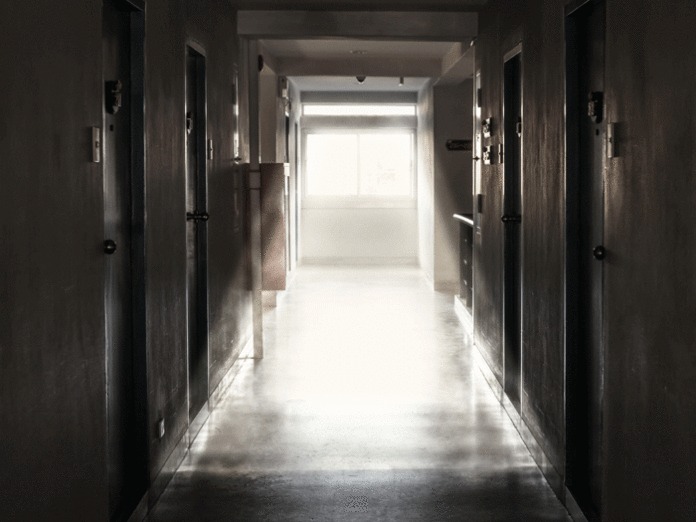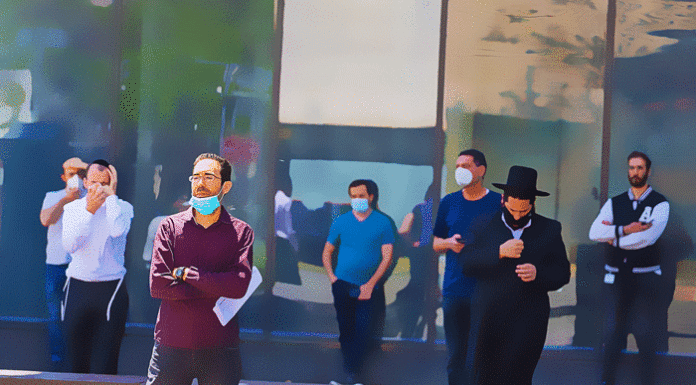In Florida, most psychiatric patients are dragged into the hospital under the Baker Act and in handcuffs. I arrived with a well-packed duffel bag.
I had spent yet another week frozen in my bed, unable to eat or communicate with anyone. The only part of me that moved was my mind. It was on tour again, frequenting every mishap of mine over the last decade.
I desperately needed relief and did the unthinkable: I asked for help.
I sent a text to my longtime friend. “Yochanan, I’m in a terrible place and I feel I may need to check myself into the hospital.”
True to the name of his organization, Healing Hearts, he extended his heart to me and embraced mine. After a brief discussion about my professional care, and the logistics of where I should go, he continued, “I will be here for you every step of the way.”
It was Friday afternoon, with but a few hours until sundown. I quickly packed a bag of essentials, clothing, my tallis, and a couple copies of a book I republished, which had gotten me through the past few months.
My supportive wife Chanie wished me well, hopeful that this decision would restore her withdrawn and rattled lion. During my battles with depression, she had been left to fend alone for months. My ever-present optimistic glint had vanished, replaced by a dull, glazed and helpless stare. I got into an Uber and headed to the hospital.
This was my second bout of deep depression. The previous one was months earlier. Then, too, I had been trapped in deep rumination and feeling lost. I recovered, or so I thought, when I found The Triumph of the Man Who Acts, a book by Edward Earle Purinton, originally published in 1916, which roused me from my despair and served as a lifeboat through the past darkness. It echoed many of the lessons and teachings I had studied my entire life. Yet here I was again, unable to muster any strength or will to proceed. I was further plagued by the feeling that I had foolishly believed I found the answers to my troubles in an old book. How did this happen? Why did this happen? I was filled with anger and regret, directed mainly at myself for allowing the depression to get this far. “If only I wasn’t so lazy,” I thought, “I’d have better fortune.”
Depression leaves one feeling as if one’s soul has been ripped out and all that remains is a crumpled heap of matter that doesn’t seem to matter at all. All systems turn inward and attack.
The blame, shame and guilt that are all symptoms of depression leave one dispirited and hopeless. Because G-d’s existence is not seen or felt in a soulless state, it’s no wonder one thinks ungodly thoughts.
In reality, when depressed, the soul is all that remains. Depression provides an opportunity to observe the soul, beyond the trappings of the mundane; it is the revelation of the soul. When nothing worldly can stimulate joy or interest, that is the world of the soul. Its only desire is to be with G-d, to do away with the troubles of the world.
On an average day an ER is bustling. I chose to arrive on one of the busiest days of the year.
“What’s your name?” the intake clerk greeted me with a smile. She was adorned in a red velvet holiday hat and silly glasses. I signed in and was led to an overcrowded emergency room.
Every bay was full, and patients still streamed in.
“Sit right there, please.” I was directed to a gurney in the hallway just outside bay #13 and was told to wait. In flashing headbands, knee-high elf socks and awful holiday sweaters, the staff moved with purpose, although adorned in the ridiculous. They rushed around as feverish elves, trying to keep up with the constant intake.
There were about 50 people packed into my corner of the ER, with more coming in.
A reindeer arrived and headed right toward me. “Hi, Ari, I’m the on-call psychiatrist. Tell me what’s troubling you.”
“Well…” I muttered, “I am deeply depressed and feel a need to be under the supervision and care of professionals…and all the hotels were booked.”
“Mental illness is no joking matter, Ari,” Dr. Reindeer intoned. I assured her I was struggling to stay at home, and my antidepressants had not been working properly. “I can admit you into our psychiatric ward for evaluation as a voluntary admission,” she suggested. I nodded in agreement.
“We have been more than busy lately. You’re not alone. One in seven adults will experience some form of cognitive disorder at least once in their lifetime. It is a national crisis. We need to get you better because left unchecked, depression carries an 11 times higher risk of suicide.” Her words were not making me more comfortable. In fact, I was downright terrified. “It’s important that you came here. Most wait until it’s too late…” she looked sadly towards other patients in the bays, barely conscious due to overdose. “We will help you here. No one should suffer needlessly.”
How many people struggle daily with depression, worried about the stigma —what an unpleasant sounding word— associated with mental illness—another unpleasant term.
To read more, subscribe to Ami





















